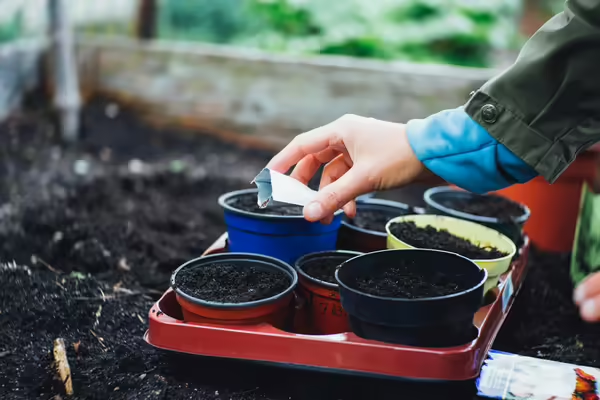
URBANA, Ill. – As gardeners dream of spring and flip through catalogs looking for the best seeds, it makes you wonder where they come. Sure, seeds come from the fruit of a plant, but how does it happen? A good challenge for any gardener is to learn how to harvest and save seed.
If you find the perfect tasting tomato, harvesting and saving the seed will ensure you can have that tomato again next season. The seed stores the genetic information for a new plant. With a bit of practice and patience, you can have the seeds of your favorite vegetables ready for next year's garden.
Provide care for plants
Healthy plants produce the best seeds. Starting with good seed gives your plants a good start. Avoid stressing plants by planting in good soil, proper watering, and reducing pest problems.
Select seeds from the plants that are healthy and thriving in your garden. Look for plants that have the healthiest plants, best fruit, or prettiest flowers.
Annual, self-pollinated plants are great plants to get started saving seeds. Some crops that fit that description are beans, peas, lettuce, tomatoes, and peppers. These plants produce seeds in one season and don't require special isolation considerations. Another benefit is that they need relatively few plants to produce seeds for harvesting.
Harvest seeds
Harvesting seed at the right time is essential. When the fruit is perfect for eating, the seed may still be too immature to be able to be viable. Mature seed is usually plump and heavy for its size. Flat, green seed is usually still too immature to germinate.
Dry fruits such as beans, peas, grain, and lettuces are simple to harvest. Collect the seed pods when they have dried, and the seed is mature. Keep in mind that seed pods can break open, causing seed to be lost.
Wet fruit such as tomatoes, peppers, and melons take a little more work. The seeds mature after the fruit is harvested for eating. Leave a few fruits on the plant to let the seeds ripen in the fruit. When the seeds are ready, the fruit will be sour or fermenting, making it unsuitable for eating.
Clean and dry seeds
Removing the seeds from all other materials is important for getting the seeds ready for storage. Seeds are usually heavier than the other plant material, so screens, a light breeze, or putting the material on an incline can separate the seeds from the rest of the material.
Remove seeds from wet fruits by removing the seeds and rinsing them with cool water until clean.
Tomatoes have gelatinous material surrounding the seeds that prevents the seeds from germinating. Fermentation is required to separate the pulp from the seed.
Remove this pulpy material by putting the seeds into a container with an equal amount of water. Cover with a cheesecloth and keep at 75 to 80°F out of direct sunlight.
Stir the mixture once a day for several days. A white mold may form, and the mixture may have an unpleasant odor. That lets you know the fermentation process is working.
After two to five days, peel the material off the top of the mixture. The seeds that have dropped to the bottom are viable seeds for collecting. Rinse the seeds until the water is clear. Allow seeds to dry on a paper plate, coffee filter, or another suitable spot.
Package and store seeds
Seeds should be kept in a cool, dry location. In a humid climate, glass jars or plastic container with a tight-fitting lid are an excellent way to store seeds. A refrigerator is also suitable for seed storage if moisture is controlled. Remember to label the containers to avoid mix-ups.
Plant the seeds in your garden. Remember that plants in the best conditions will grow into plants that will give you the best seed to collect next year.
ABOUT EXTENSION: Illinois Extension leads public outreach for University of Illinois by translating research into action plans that allow Illinois families, businesses, and community leaders to solve problems, make informed decisions, and adapt to changes and opportunities.